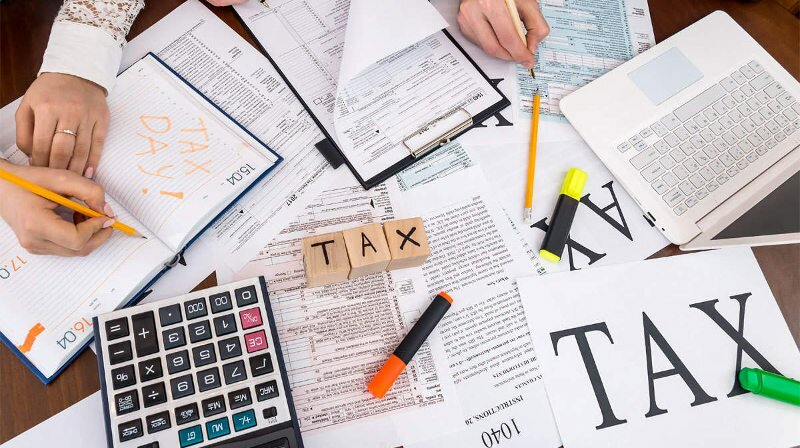Paying taxes is something that no one wants to make any mistake on. You can face a lot of legal trouble just by misreporting a little. This doesn’t even have to be your fault most of the time. Sometimes you are just not sure how taxes work. That’s why it’s very important to know the ins and outs of the taxation system especially if you do not have an accountant.
If filing your taxes isn’t already a daunting task, doing it as a foreigner in any country can be even more frustrating. This is especially true for countries like Vietnam wherein most foreigners don’t speak the language. You can, of course, get an accountant but you still need to make sure that you are being asked to pay for the right taxes to avoid any issues.

As a foreigner working in Vietnam, you need to decode some things to determine if the Personal Income Tax is applicable to you. In this article, we list down everything you need to do to avoid problems as a foreigner paying taxes in Vietnam.
This article will therefore cover the different situations:
- If you are a young expat working in Vietnam (for a local or foreign company)
- If you are an entrepreneur or freelancer for a foreign company living in Vietnam
- If you are retired: married or single but staying several months a year in Vietnam
Types of Foreign Workers in Vietnam
There are two types of foreigners living in Vietnam: tax resident and non-resident. The type of worker you are will dictate how much Personal Income Tax you will pay.

Before we go into furthers details of how to know whether you are a resident or non-resident, we will first clear up when your days of stay starts. You should note that your arrival and departure days are counted as one day. If you arrive in Vietnam before your assignment starts, you will be asked to file your taxes from the first month of arrival but only if you are considered as a resident.
Non-resident
A non-resident is someone who lives in Vietnam for less than 183 days in a year (12 consecutive months) as a non-resident based on Section I, Part A of Circular No. 84/2008/TT-BTC. The individual does not have permanent accommodation (lease contract is 90 days and below).
Taxable income
As a non-resident, the only income that will get taxed are income that you earned in Vietnam. This means that income that non-residents acquired abroad will not be subject to PIT. Non-residents are subject to pay a flat rate of 20% of their personal income that is paid in Vietnam.
Residents
You are considered as a Vietnamese resident if you stay in Vietnam for more than 183 days a year in a period of 12 consecutive months. It is recommended to be registered to the Consult as an Expat Living in Vietnam to be sure you are properly there and won’t face potential taxes from your home country. They should also have a permanent address which is written in their temporary or permanent residence card. Those who do not possess a residence card but live in Vietnam for more than 183 days are still considered as residents.
Taxable income
 As a resident, you will be asked to pay taxes on any income that you acquire regardless of whether you received the income in Vietnam or abroad. Similar to other taxation systems, residents will be asked to pay a tiered taxation scheme from 5 percent to as much as 35 percent.
As a resident, you will be asked to pay taxes on any income that you acquire regardless of whether you received the income in Vietnam or abroad. Similar to other taxation systems, residents will be asked to pay a tiered taxation scheme from 5 percent to as much as 35 percent.
Taxation Scheme Residents
| Average yearly income (in VND) | Average monthly income (in VND) | Tax rate (in percent) |
|---|---|---|
| 60,000,000 and below | 5,000,001 to 10,000,000 | 5% |
| 60,000,001 to 120,000,000 | 10,000,001 to 18,000,000 | 10% |
| 120,000,001 to 216,000,000 | 18,000,001 to 32,000,000 | 15% |
| 216,000,001 to 384,000,000 | 32,000,001 to 52,000,000 | 20% |
| 384,000,001 to 624,000,000 | 32,000,001 to 52,000,000 | 25% |
| 624,000,001 to 926,000,000 | 52,000,001 to 82,000,000 | 30% |
| 926,000,001 and above | 82,000,001 and above | 35% |
For residents earning in foreign currencies, your taxable income must be converted to Vietnamese Dong (VND) based on the exchange rate published by State bank of Vietnam on the day the income was received.
Tax issues in Vietnam may be difficult to handle alone especially if you are living in Vietnam for a few months only. Feel free to download the copy of our e-book covering other subjects relating to living as an expat in Vietnam.
Questions about taxes, taxation, accounting? Download our book
Other Taxable Income
- Income from capital investments and dividends – These are treated as non-employment income and are taxed at 5% for both residents and non-residents. However, residents do not need to pay PIT from this if they are a sole proprietor.
- Income from the capital assignment – Residents are taxed 20% of net gains while non-residents are taxed 0.1% of the gross sales.
- Rental income – Income acquired through renting property is considered as a business income and are taxed the same way as those.
- Income from property transfer – These are taxed at 25% on gross gain or 2.0% on gross sales for both residents and non-residents.
- Income from lottery winnings – Lottery winnings from 10 million VND are taxed at 10% for both residents and non-residents.
- Inheritance and gifts – Gifts from employers to employees are considered part of your employment income and are therefore taxed with your whole income for each according to the taxation scheme. Inheritance, on the other hand, are taxed 10% of the value for both residents and non-residents.
Once your labor contract ends and before you leave Vietnam, you need to settle your taxes with the right department to avoid any penalties.
Tax Exemptions
Of course, not all of your income is subject to tax. Whether you are a resident or a non-resident, there are tax exemptions for you.

- Income from real estate transfer between husband and wife; father and mother with biological children; adoptive father and adoptive mother with adopted children; and other first degree relations. Note that transfers are different from inheritance.
- If you are an expat who relocated to Vietnam through their company, you might have received a relocation allowance to help you during your move. This allowance is tax exempted along with round-trip airline tickets that your company may have paid for you as part of your relocation benefits.
- Retirement pension received from abroad for foreigners residing in Vietnam.
- Most expats also receive tuition fee assistance or even have the full tuition fee paid for their children by their company. This benefit is also tax exempted.
- Training fees are also non-taxable as long as the training is relevant to the expat’s line of work.
- Do you receive lunch or midday allowance from your employer? This amount is also exempted from being taxed.
- Allowances you get for telephone/mobile phone subscription, stationary, and work uniform is also exempted as long as they fall under the regulated per diem amount stipulated by state laws.
- The income you receive for overtime work or working the night shift is also tax-exempt given that the amount is higher than the normal working hour salary.
Tax Deductions
Similar to what you have in your home country, you also get tax deductions depending on the number of dependents you have.

Who are considered as dependents?
- Your children who are 18 years old and below
- Children who are older than 18 years old but are low-income (not earning more than $21 or VND 500,000 per month)
- Your parents who are unable to work
- Spouses who are also unable to work or not working
How much are the deductions?
Deduction are at $155 or 3,600,000 VND per qualified dependent.
Relief for Foreign Taxes
There’s nothing worse than having to pay taxes twice in your home country and in Vietnam so its a good thing that Vietnam has signed a double tax agreement with seventy countries as well as a bilateral agreement with the USA.
These agreements allow you to credit any tax you have paid in your home country. In order for you to rightfully credit previously paid taxes, you need to submit your duly filled-out tax exemption form, income tax return, tax vouchers, and tax receipts.
Among the seventy countries who have an agreement with Vietnam are countries, Australia, Japan, Canada, and China. To check the specific type of agreement your country has (if any) with Vietnam, it is best to check with your embassy or consulate.
When are taxes due?
Knowing when taxes are due is the key to never handing them in late! Each country has their own schedule so you should definitely look up when it is best to file your taxes in Vietnam.

If you are an expat and are working for a multi-national company, your company should finalize all your PIT at the beginning of the year. So for example, your PIT for 2019 will be finalized at the beginning of 2020. For the majority of expatriate workers in Vietnam, personal taxes are deducted directly from your personal income and directly visible on your monthly salary slip. If you have no other sources of income, you do not have to do anything and you are in good standing with Vietnamese taxes.
In the case of foreign residents who have more than one income streams, you should ask for a certificate from your company which is considered as a foreign-invested enterprise (FIE). This certificate proves that your company has finalized your taxes and that this can be deducted from your total PIT.
Not all foreign residents in Vietnam are expats there are those who are also freelancers or are hired as contractors by a local Vietnamese company. If this is the case, you will need to file your taxes before the 90th day of the year. You may also prefer to pay monthly and in this case, you should pay on every 20th day of the month.
Do you have any questions about taxes in Vietnam? Consult our guide on this subject
Q&A How to Pay Taxes as a Foreigner in Vietnam?
🏦 Is it possible to pay taxes in Vietnam without hiring an accountant?
Yes. We do understand that taxation system in Vietnam might look overwhelming. Nevertheless, if you study it well enough, you will be able to pay your taxes without the help of an accountant.
🌎 Receiving salary from overseas for expats in Vietnam ?
I moved to Vietnam but continue working for a company in my home country. Do I have to pay a personal income tax in Vietnam? If you are a non-resident of Vietnam (living less than 183 days a year), there is no need for you to pay a personal income tax on your foreign earnings. However, if you have an official status of a resident in Vietnam, you will be subject to a PIT. Please consult our article or free book in order to get more acquainted with the taxation system in Vietnam.
💲 What do I do if I get salary in US dollars?
If you are a Vietnamese resident, your personal income tax will be calculated based on your salary converted to Vietnamese Dong (VND).
🇻🇳 Do Vietnamese citizens pay the same taxes as expats?
It depends on the official status of an expat – whether they are a non-resident or a resident. While non-residents are not subject to the majority of taxes in Vietnam, residents need to pay virtually the same taxes as Vietnamese citizens.
💰 I already pay most of my taxes in my home country. Do I have to pay them in Vietnam, too?
Vietnam has double tax agreements with 70 other countries. Among them are the US, Canada, China, most of the European countries, and many other. Please check your country’s regulations in order to see whether you can avoid paying double taxes.
How to file your taxes?
If you are filing and paying your taxes on your own, you can do it in two ways, cash payment or bank transfer. You can pay directly to the state treasury and receive a tax voucher indicating that you have filed and paid before the deadline. If you choose to pay via bank transfer, you can transfer your money to a tax office treasury bank account.

For those, who are filing taxes with an accountant, you should check with them if they will also be doing the payments or if they will only the filing.
A final note for those who want to profit from the relief tax system that your country might have as an agreement with Vietnam. As we mentioned earlier, you need to present a certificate and/or your income tax return from your home country. This means that you need to file your taxes there first and then present your proof of payments in Vietnam.
What to do when your time in Vietnam is up?
All good things come to an end. The same goes for the stay of most foreigners in Vietnam. Before you leave Vietnam, you should make sure that all your taxes have been filed properly.
Although the immigration department and the tax department do no communicate consistently, there have been a few instances of foreigners who were denied to leave the country due to outstanding tax balances. If the tax year is not over yet, you need to pay your taxes at least 45 days after the last day of the termination of your contract. Failure to do so may also prevent you from leaving the country.
For foreigners who are returning to Vietnam, you may need to amend your taxes if your return affects your residency status. So double-check the number of days you are not in Vietnam and when you are in the country.
In conclusion…
Overall, paying taxes in Vietnam is not so complicated as long as you have the right information. As we mentioned earlier, it is still best for foreigners who cannot speak the language to get an accountant to file your taxes to ensure that you make zero mistakes.
We hope that this article helped in answering all the questions you have regarding how taxes work for you as a Foreigner in Vietnam. If you have any other questions please comment them below and we will try our best to answer them. Did we miss out some information? Get additional knowledge inside the e-book and ask me personally by sending me an e-mail.
Need more information on taxes in Vietnam? Ask me your questions in private
